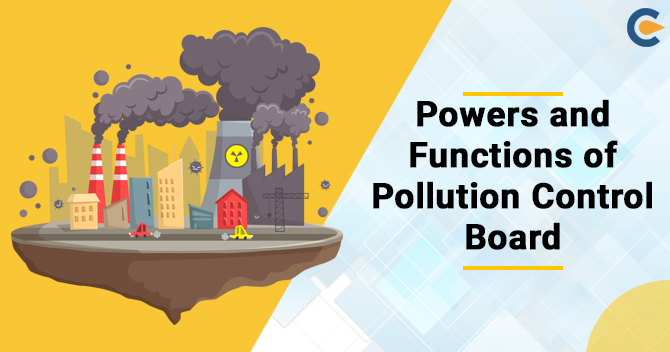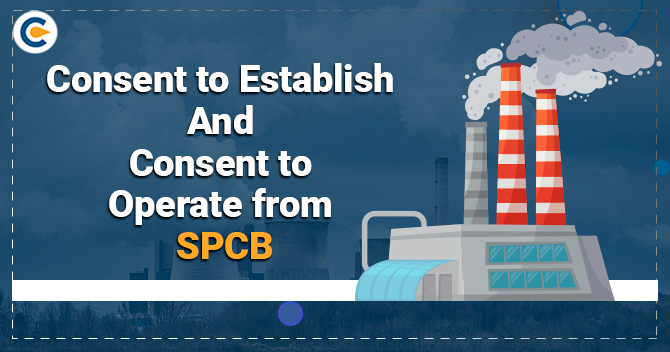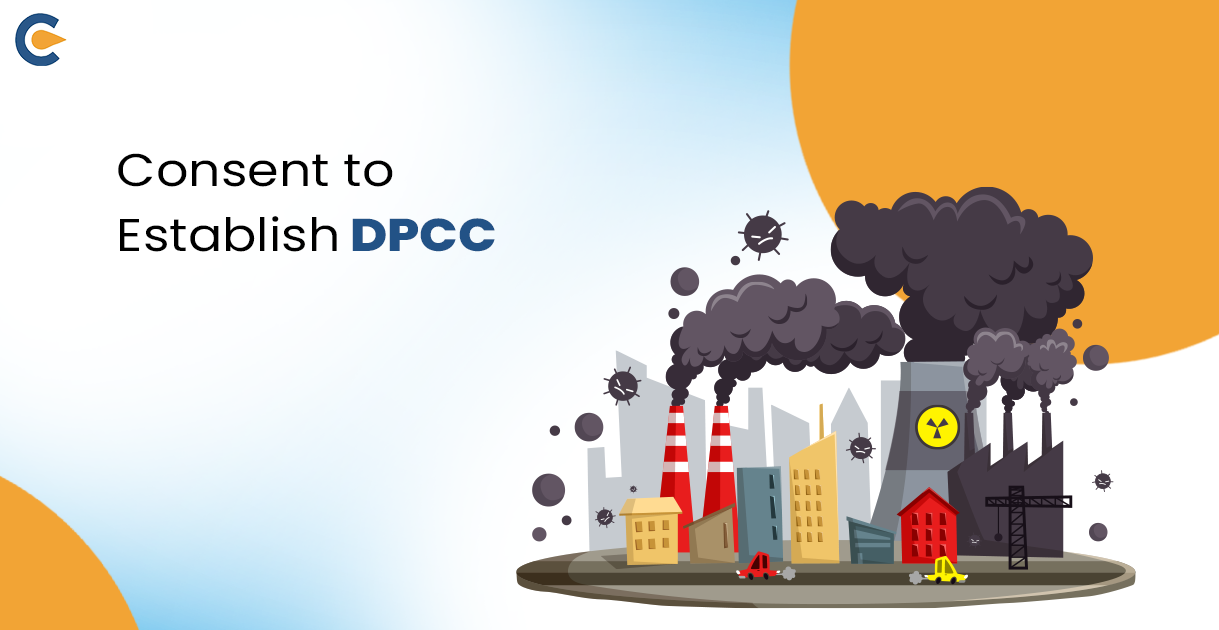The Water (Prevention & Control of Pollution) Act, 1974, deals with the constitution of the Central Board, State Boards, and the Functions of Pollution Control Board. According to Section 3 of Water (Prevention & Control of Pollution) Act, the Central Board is constituted by the Central Government is known as the Central Pollution Control Board.
The Central Board must be considered a body corporate with perpetual succession with the power to acquire, hold, and dispose of it. Section 3(3) of the Water (Prevention & Control of Pollution) Act, 1974, can also enter into a contract with the person or party. They can sue or can be sued in the name of the Central Board.
According to Section 4, the State Boards must be constituted by the State Government, which is known as the State Pollution Control Board. Every State Board must be considered as a body corporate having perpetual succession with the power to hold, acquire, and dispose of the property. It can also enter into a contract with any person or party. They can sue or can be sued in the name of State Boards.
Functions of Central Pollution Control Board
According to section 16 of the Water (Prevention & Control Pollution) Act, the Central Board has assigned to discharge its functions, that are stated as below:-
Advise Central Government
The Central Pollution Control Board has to advise the Central Government[1] on preventing and controlling water pollution.
Co-Ordination with the State Board
Central Pollution Control Board is to co-ordinate Active-Board activities to resolve disputes among them.
Technical Assistance and Guidance to State Boards
The Central Pollution Control Board has to provide technical assistance and guidance to State Boards, to carry out investigations and research relating to the problem of water pollution and prevention, control, or reduction of water pollution.
Various Training Programs
The Central Pollution Control Board is to organize and plan the training programs for persons engaged or engaged in prevention, control, or reduction of water pollution.
Organizing a Comprehensive Programme
The Central Pollution Control Board is to organize a comprehensive program through mass media regarding controlling and preventing water pollution.
Functions as State Board
The Central Board can perform such functions of any State Board as may be specified under section 18(2) of the Water (Prevention & Control of Pollution) Act, i.e., “power to give directions.” Such directions will bound every State Board in writing as the Central Government or State Government can provide it.
Publication of Statistical and Technical Data
The Central Pollution Control Board has to collect, compile, publish technical and statistical relating to water pollution. The measures taken for its effective prevention and control and also prepare manuals, codes, or guides related to the treatment and disposal of sewage and trade effluents and disseminate information are also connected.
Laying Down Standard for Stream and Well
The Central Pollution Control Board has to lay down, modify or annul, in consultation with a State Government concerned the stream’s standards.
Execution of Program at National Level
The Central Pollution Control Board has to plan and cause to be executed by a nationwide program for the prevention, control, or reduction of water pollution.
Read our article:Consent for NOC from State Pollution Control Board
Functions of the State Pollution Control Board
According to section 17 of the Water (Prevention & Control of Pollution) Act, 1974, State Board has to perform the following functions:
Planning Comprehensive Programs
State Pollution Control Board has to plan a comprehensive program for the prevention, control, or reduction of pollution of streams and wells in the state and secure its execution.
Advisory functions
The State Pollution Control Board advises the state government on any matter concerning the prevention, control, or reduction of water pollution.
Dissemination of Information
State Pollution Control Board has to collect and disseminate information relating to water pollution and the prevention, control, or reduction thereof.
Investigation and research
State Pollution Control Board is to conduct, encourage, and participate in an investigation. Also, research relating to problems of water pollution and prevention, control or abatement of water pollution.
Organizing training program
The State Pollution Control Board has to collaborate with the Central Board in organizing the training of persons engaged in programs related to the prevention, control or abatement of water pollution and to organize mass education programs relating to that.
Inspection of sewage and trade effluents plants
State Pollution Control Board has to inspect sewage or the trade effluents works and plants to treat sewage and trade effluents. They are also required to review plans, specifications, or other data relating to plants set up for the works for the purification, treatment of water, and the system of the disposal of sewage or trade effluents connected with the grant of any consent.
Standards for Causing Discharge of Water
NOC Pollution Control Board has to check, modify effluent standards for the sewage and trade effluents. They need to check the quality of receiving waters resulting from effluents’ discharge and to classify water of the state.
Economic Methods of Treatment of Sewage
State Pollution Control Board has to evolve economical and reliable methods for the treatment of sewage and trade effluents, with regard to the peculiar conditions of climate, soil, and water resources in different regions.
Methods Regarding Utilization of Sewage
State Pollution Control Board has to evolve methods of utilization of sewage and suitable trade effluents in agriculture.
Methods for Disposal of Sewage
State Pollution Control Board has to evolve efficient methods of disposal of sewage and trade effluents on land, as are necessary on account of the predominant conditions of scant stream flows that do not provide for a major part of the year, the minimum degree of dilution.
Standards for Treatment of Sewage
State Pollution Control Board has to lay down the standards of sewage treatment and trade effluents to be discharged into any particular stream. It takes into account the minimum fairness, weather dilution is available in that stream, and whether the tolerance limits of pollution permissible in the water of the streams after the discharge of suit effluents.
Advisory Functions
The State Pollution Control Board must advise the state government about the location of any industry the carrying out of which is likely to pollute a stream or well. Besides the aforesaid statutory functions. Moreover, the State Board also performs functions as may be prescribed from time to time or may be entrusted to it by the Central Pollution Control Board or the State Government.
Powers of Central Pollution Control Board
The Central Pollution Control Board has the following powers:-
- The Central Pollution Control Board has been empowered by Section 18 of the Water (Prevention & Control of Pollution) Act to give directions to the State Pollution Control Boards.
- The Central Pollution Control Board has the powers to perform any of the functions of a State Pollution Control Board in case of a non-compliance with the Central Pollution Control Board’s directions.
- The Central Pollution Control Board has been empowered to issue directions under section 33A of the Water (Prevention & Control of Pollution) Act to direct the prohibition, closure, or regulation of any operation, industry, or process or regulation of supply electricity, water or any other service.
Powers of State Pollution Control Board
The State Pollution Control Board has the powers conferred on it are as follows:


List of Important Cases along with its Interpretation
- The Supreme Court in M.C.Mehta v. Union of India held that the ternaries’ financial capacity is not the relevant consideration while requiring them to set up the primary treatment plants. The industry which cannot set up the primary treatment plant cannot be granted consent by the State Pollution Control Board to continue its business.
- It was held in Narula Dying and Printing Works v. Union of India that the consent order made under section 25 (2) of Water (Prevention & Control of Pollution) Act by the State Pollution Control Board does not entitle the industrial unit to discharge trade effluents into a stream. A unit must comply with the conditions mentioned in a consent order and install effluent treatment plants with the consent order’s time.
- In the matter of Mahavir Soap and Godakhu Factory v. Union of India, the State Pollution Control Board refused to consent to the factory’s continuation in the populated area on the public complaint. It was held that genuine reason for the refusal to grant consent. The Court further had no reason to substitute its opinion in place of State Pollution Control Board’s decision.
- In the matter of T.N. Godaverman Tirumalpad v. Union of India, it was held that where various sources of pollution are regulated by a State Pollution Control Board step by step. It was not for Court to direct the government as to which step has to be regulated first.
- The Supreme Court in Andhra Pradesh Pollution Control Board v. M.V. Nayudu stated that prohibition under section 25 of Water (Prevention & Control of Pollution) Act, extends even to newly opening industries in the process of being set up. Hence, permission required from a State Pollution Control Board must be sought when steps are being taken to establish an industry.
- In the matter of Mahabir Soap and Godakhu Factory v. Union of India, the State Pollution Control Board, refused to consent to the continuation of industry on the ground that the factory is located in the populated area, and there was a public complaint. It was held that the reasons cited by the State Pollution Control Board conform with the object of the Water (Prevention & Control of Pollution) Act. The Court further held that the refusal is at the discretion of the State Pollution Control Board.
Conclusion
The Water (Prevention & Control of Pollution) Act has vested with some necessary powers and functions of Central Pollution Control Board and the State Pollution Control Boards. These, in turn, enable the Boards to perform their duties in regulating the environment.
The Boards have involved the courts’ jurisdiction for enforcing various decisions taken by them and thus ensured that the polluters of the environment do not escape their responsibilities. CorpBiz shall be at your disposal for any assistance you wish to avail of.
Read our article:Renew Pollution Control Board Certificate: How to obtain Consent to operate?











